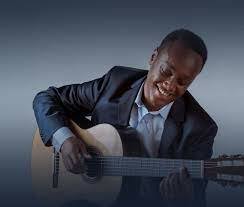New York, NY (Top40 Charts) "My first album for Deutsche Grammophon stems from a desire to share my love for Baroque music," says rising-star French guitarist Raphaël Feuillâtre. Visages baroques, out today, presents music by J.S. Bach and his French contemporaries Forqueray, Rameau, Royer and Duphly. The carefully curated programme translates works mostly conceived for solo harpsichord into the colourful soundworld of the guitar. They are performed by the first guitarist signed to DG in many years, an artist hailed as "a tremendously versatile and sensitive player" (Classical Guitar).
"The title Visages baroques ("Baroque Faces") refers to the new aspect given to each work by its arrangement and to the different facets of the guitar highlighted by the diverse selection of music," explains Feuillâtre, who also notes the valuable additions to the guitar repertoire represented by these transcriptions, several of them unpublished. The musicians behind them include his teachers Michel Grizard and Judicaël Perroy, fellow French guitarist Antoine Fougeray, and German guitarist Gerhard Reichenbach, as well as Feuillâtre himself.
Visages baroques features two large-scale works by Bach, the first of which is the Concerto in D major BWV 972, itself a transcription for harpsichord of a violin concerto from Vivaldi's L'estro armonico. Judicaël Perroy's arrangement preserves the sense of solo and accompanying strings and, adds Feuillâtre, "brings a brightness and a virtuosic, orchestral dimension to the programme".
The second is the Partita No. 1, BWV 825, the keyboard work that introduced Feuillâtre to the world of Baroque music. "For me," he says, "the guitar can enhance the style of writing in this suite of dances, while at the same time fully embodying its intimate character."
Woven around these two works is a sequence of six French character pieces which begins with Feuillâtre's own arrangement of the charming "L'aimable" by Joseph-Nicolas-Pancrace Royer (1703‑55), music teacher to the children of Louis XV. It continues with "L'entretien des muses" and "Les cyclopes" by Jean-Philippe Rameau (1683-1764), a titan of the French Baroque, and also includes "La Bellmont" by the virtuoso viola da gamba player Antoine Forqueray (1672-1745) and two pieces by harpsichordist and composer Jacques Duphly (1715-89), "La Forqueray" and "Médée".
The tracklist is framed by two short pieces by Bach, the Prelude in C major from the first book of The Well-Tempered Clavier and the Gavotte en rondeau from his E major Partita for solo violin. The latter serves as both an encore and a reminder of the presence throughout the album of the rondo, a musical form that combines a recurring theme with contrasting episodes. "It leaves the listener in a light, joyous, dancing mood," says its performer.
Born in 1996 in Djibouti and raised in France, Raphaël Feuillâtre studied guitar in his home town of Cholet, then in Nantes, and finally at the Paris Conservatoire. His breakthrough came in 2018 when he won the prestigious Guitar Foundation of
America International Concert Artist Competition. Critics have showered praise on his eloquent performances of everything from early works for guitar to the instrument's great Romantic showpieces, original contemporary compositions and a wide range of transcriptions.
Feuillâtre signed his contract with DG in
September 2022. His debut single, an arrangement of Couperin's Les barricades mystérieuses, was an immediate streaming success, amassing over 1.2 million streams in the first two months following its release.
Feuillâtre will appear on STAGE+ as part of its exclusive Rising Stars series in a programme screened on 4 April. He also undertakes an extensive North American tour in March and April, during which he will make his Carnegie Hall debut.
























